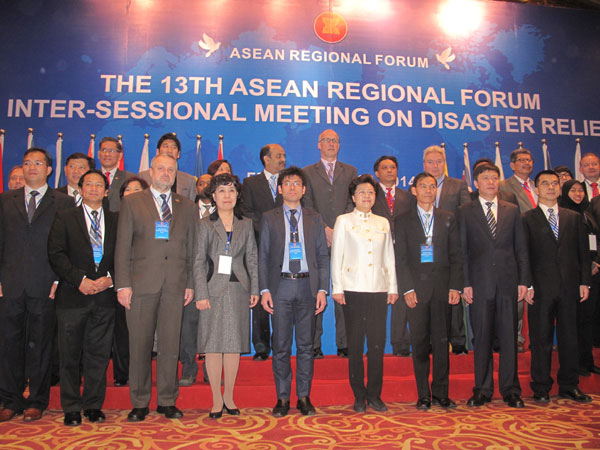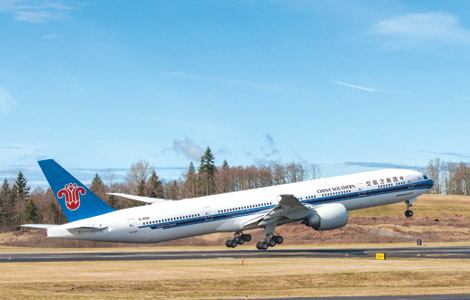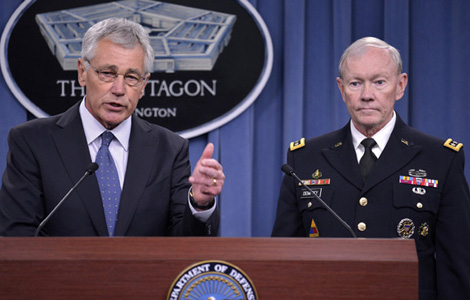ASEAN members call for early warning disaster system
Updated: 2014-02-27 20:09
By Huang Zhiling (chinadaily.com.cn)
|
||||||||
 |
|
Delegation heads pose for a group photo during the 13th ASEAN Regional Forum Inter-Sessional Meeting on Disaster Relief, which began on Thursday in Chengdu, Sichuan province. Photo by Huang Zhiling |
Under the grim situation of frequent natural disasters in the Asian-Pacific area, member states of the Association of Southeast Asian Nations Regional Forum must further cooperate, said participants to the 13th ASEAN Regional Forum Inter-Sessional Meeting on Disaster Relief in Chengdu, Sichuan province.
The two-day meeting opened on Thursday.
In her keynote speech, Jiang Li, deputy civil affairs minister, suggested establishing a cooperation mechanism for disaster monitoring and early warning.
"ASEAN member countries have yet to improve the early warning system, which has been proved in the case of Typhoon Haiyan in the Philippines," said Wei Shengyi, a program officer with the Department of International Cooperation in the Ministry of Civil Affairs.
"With a sound early warning system, for instance, one member state with the backing of satellite technology can tell another member state that a typhoon or tsunami is impending on its territory," he said.
Endorsing this view, Shirish Ravan, head of the UN-SPIDER Beijing Office, said that member states have the technology and that it was important to relay the message of an impending disaster to residents.
UN-SPIDER is the United Nations Platform for Space-based Information for Disaster Management and Emergency Response.
China would like to propose the promotion of building an information sharing mechanism, improving the liaison system and setting up a sharing platform for space information data and products among member states, Jiang said.
"Asia Pacific is a region subjected to frequent natural disasters. Hazards like floods, droughts, typhoons, earthquakes and tsunamis pose a grave threat to human lives and economic activities. Reducing the risk of such natural disasters cannot be more important for regional stability and sustainable economic and social development," she said.
The ASEAN Leaders Summit of 1992 called for positive responses to the ending of the Cold War by widening and deepening the scope of the region's external relations. A particular emphasis was placed on security.
After more than two decades of development, the ASEAN Regional Forum has become the most inclusive and influential security forum in the Asia-Pacific region and has developed a set of effective models and principles for dialogue and cooperation.
With the theme of natural disaster management, the 13th ASEAN Regional Forum Inter-Sessional Meeting on Disaster Relief, which is being hosted by the Ministry of Foreign Affairs and the Ministry of Civil Affairs, has drawn member states from ASEAN as well as China, Japan, South Korea, the United States, Russia, Australia, New Zealand and the European Union.

 Airline receives its first Boeing 777-300
Airline receives its first Boeing 777-300
 Freediver takes cheeky selfie with sperm whale
Freediver takes cheeky selfie with sperm whale
 Buried gold coins unearthed in California
Buried gold coins unearthed in California
 Beaming with pride
Beaming with pride
 US expels Venezuelan diplomats
US expels Venezuelan diplomats
 Pentagon chief plans to reduce US army size
Pentagon chief plans to reduce US army size
 2nd Madoff aide testifies, denies knowledge of fraud
2nd Madoff aide testifies, denies knowledge of fraud
 TAO Dance troupe premieres '5' at NYU
TAO Dance troupe premieres '5' at NYU
Most Viewed
Editor's Picks

|

|

|

|

|

|
Today's Top News
US space telescope spots 715 more planets
Bags banned in Boston Marathon
Asiana fined $500,000 over SF crash
TPP talks in final stretch
LA rolls out the red carpet
Spotlight on Chinese publishing
Weibo faces modest growth in '14
Services top US firms' revenue
US Weekly

|

|






